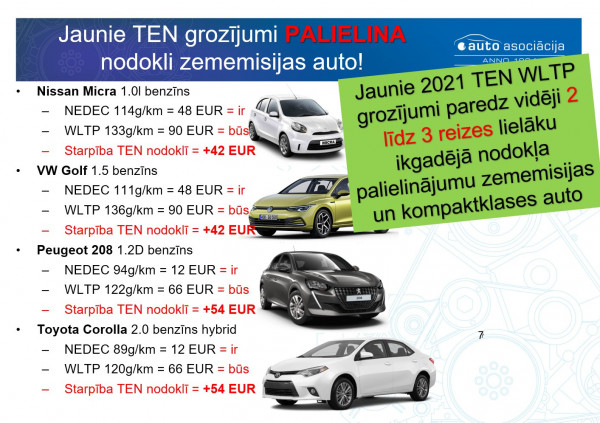Car taxes have been rewritten to absurdity
By acting like a big climate lover, the ruling coalition has changed this year's car taxes so that the climate can only deeply sigh: for new cars with microscopic engines that leave almost no trace in the atmosphere, the Vehicle Operation Tax is increased, but for premium class and sports cars with giant engines - significantly reduced. A year and a half of talking about climate change has ended in generous service to the rich and damage to the middle class and the poorest.
This year's changes have been summarized in clear tables by the Automotive Association (Auto Asociācija). The very same organization led by Andris Kulbergs, which together with the Russian gas traders led by Aigars Kalvītis, lobbied for changes in car taxes in the name of climate. One was to ban the import of used cars so people would be forced to buy new cars with lower emissions on credit. The other tried to insert a gasification stage of the car fleet before the electrification. So the number of fossil fuel cars would increase even more. Both of them succeeded a bit, but the end result is absurd.
Bentley is better than a Micra
The Automotive Association has prepared wonderful illustrations for the year-and-a-half-long work of the Ministry of Transport, the government, and the Saeima. Here is one example. It's hard to imagine a smaller, more modest, and uglier car than the Nissan Micra. Engine capacity the same as a motorcycle - 1 liter. Last year, the vehicle maintenance tax for it was 48 euros, but this year it has been increased to 90 euros. Expressing the absolute numbers as a percentage, it turns out that the tax increase is 87.5%!

What could be the complete opposite of a Micra? That's right - the Bentley Continental with a 4-liter engine. A nice car, but only available to very rich people. Also, emissions are far more than from a Micra. And here, in the name of saving the climate, the vehicle maintenance tax for it has not been increased but significantly reduced. Last year they had to pay 408 euros, but this year 268 euros. This is 150 euros less or -65.7%. In a broader opinion article, the changes in car taxes in 2021 have been reviewed by Andris Kulbergs, head of the Automotive Association, and here is his main conclusion: “So the end result of these changes is that Vehicle Operation Tax (VOT) for newly registered small cars will increase significantly and will decrease for premium sports cars. In addition, it will be significantly different for completely identical cars depending on the date of registration."
Emission measurement methodology was changed
The origins of this absurdity can be traced to the link between taxes on emissions and the new methodology for calculating emissions. It should be recalled that in the past, manufacturers measured emissions under laboratory conditions. In reality, emissions were much higher, so most car companies cheated. This methodology is referred to as New European Driving Cycle (NEDC). With the Dieselgate, large-scale fraud came to light, and now, coming into effect from 1 January 2021, a new Worldwide Harmonized Light Vehicle Test Procedure (WLTP) has been introduced to measure emissions under real-life engine conditions. Thus, in the future, two tables will be used in the calculation of vehicle maintenance tax, one, according to the old NEDC standard, for cars registered before the end of last year. The second according to the WLTP standard - for cars registered after January 1 of this year. According to the Automotive Association, it is a fundamental mistake to use the moment of change in standards as a basis for changing taxes: "Unfortunately, when creating this VOT calculation table according to the WLTP standard the EU's recommendation not to use the change in these standards as a basis for tax increases was not taken into account."
Service for the premium segment

The Latvian government has done the exact opposite - it has immediately linked the change in standards to changes in tax rates. As there are more people in Latvia who drive small cars with even smaller performance, they will be charged more. But how many people drive new and very expensive cars, such as the already mentioned Bentley, BMW X5M, or Porsche 911 turbo S? Criminals, wealthy businessmen, influential politicians, and their lovers all drive with those. The coalition representatives have shown special kindness to these relatively small groups of society. Probably because they are going to buy new premium class cars this year. But in the meantime, the state budget should be supplemented by those who dream of driving with a new ugly Micra.
It should be recalled that a year ago it was planned to change car taxes in an even more harmful way for the majority of the society. And, as has been the case lately, in the name of climate protection.
There will be no trains, just spending
First, the coalition lobbied for the idea of a total ban on the import of used cars, then the interpretation appeared that a three-year-old car is considered old, then it was five. Although this is in stark contrast to the nature-friendly understanding of the sustainability of things. When this plan failed, the coalition tried to introduce a completely new tax on all cars imported to Latvia, but again, after a great scandal, this idea was abandoned. It turned out that the money is not needed for some climate programs, but to buy diesel trains. In the end, the biggest tax increase has been experienced by the owners of heavy and freight transport, the company fleet. But they also failed to collect the necessary money for the trains. In addition, the European Commission has declared the idea of purchasing diesel trains as harmful to the climate. At the end of last year, it was clear from the documents prepared by the Ministries of Finance and Transport that the annual Vehicle Operation Tax would not actually change - only the procedure for calculating emissions - a methodology which no one really understood. But they will understand this year, when arriving with their new car for a technical inspection and annual tax payment. The owner of Micra will be angry, the owner of Bentley will be happy.